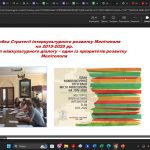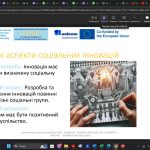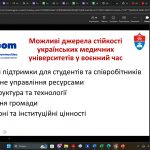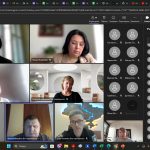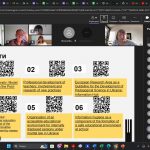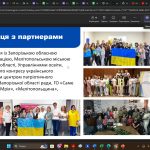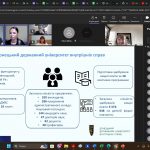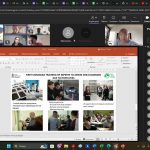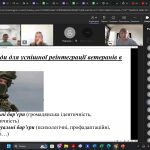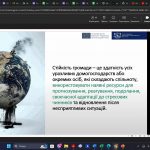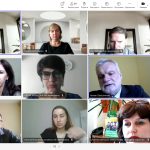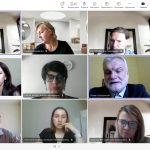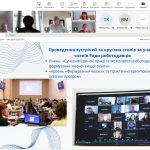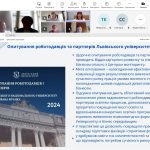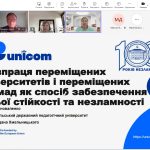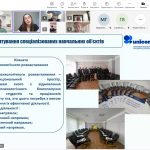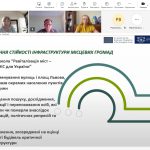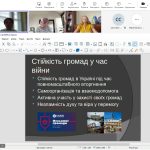On July 2, 2024, within the implementation of the ERASMUS +KA 2 CBHE project “Universities Communities: strengthening cooperation” (“Universities, local communities: strengthening cooperation”) UNICOM No. 101083077 a UNICOM workshop “Resilient Universities – Resilient Communities” was held in an online format for University representatives – members of the consortium.
During the war, Ukrainian Universities and communities gain a remarkable experience ofresilience. Their role as key authors in strengthening economic and social development. will be extremely important for the post-war reconstruction of Ukraine. Social activity and entrepreneurial events form an important part of the University life besides education and science, and hence in social life as well.
During the day, the participants had an opportunity to attend three plenary sessions, each of which highlighted different aspects of the – resilience of Universities and communities:
1. Resilience as a stabilizing factor for Universities and communities in the time of acute social challenges: theory and practice.
2. Non-governmental sector and ensuring resilience in cooperation between Universities and communities.
3. Practice of cooperation between Universities and communities in war times to ensure resilience.
The participants were addressed with welcome speeches delivered by Roman Hladyshevskyi, vice-rector for scientific work of the Lviv National University named after Ivan Franko; Diana Spulber, UNICOM project coordinator, the University of Genoa, Yehor Nazymko, first vice-rector of the Donetsk State University of Internal Affairs, Tetiana Konovalenko, vice-rector for science, innovation and international cooperation of the Melitopol Pedagogical University named after B. Khmelnytskyi.
During the first plenary session dedicated to “Resilience as a stabilizing factor for Universities and communities in the time of acute social challenges: theory and practice”, the speakers shared their experience on the following topics: “The role and development of the University to strengthen the resilience of communities” (Marharyta Lyshenko, the Sumy National Agrarian University ),“Multiculturalism as a factor of sustainability and resilience of the community during the war” (Olena Arabadzhi, the Melitopol State Pedagogical University named after Bohdan Khmelnytskyi), “The best European experience of social innovations in education: prospects for Ukraine” (Maryia Nesterova, the Ukrainian State University named after Mykhailo Drahomanov ), “Resilience of communities in the time of war” (Marianna Hladysh, the Lviv National University named after Ivan Franko), “Determining the sources of resilience of Ukrainian medical Universities: a vital skill in difficult times” (Viktoria Rodnikova, the Vinnytsia National Medical University named after Mykola Pyrohov ).
In her report, Maryia Nesterova emphasized the importance of civil protection of the population and the need for unification. While describing the prospects for Ukraine, her attention was focused on the adaptation of European practices, cooperation with non-governmental organizations, and civil protection.
Viktoria Rodnikova emphasized the importance of creating rehabilitation centers for each community, stabilizing funding by foreign students, and expanding relations with foreign partners.
During the second plenary session “Non-governmental sector and ensuring resilience in cooperation between Universities and communities”, Mykhailo Vikhliaiev, director of the NGO “The Center for Ukrainian-European Scientific Cooperation” talked about creating the Association of Law Faculties of Ukraine, the implementation of which is community support, consultations, combating crime and corruption, providing advisory services. Special attention was focused on the cooperation between NGO and the Donetsk State University of Internal Affairs.
Oksana Zabolotna, a representative of the Uman Pedagogical University named after Pavlo Tychyna, spoke about the Ukrainian Association of researchers of education and its mission, which is to support educational research and researchers of education.
Iryna Snovydovych, a representative of the National University of Lviv named after Ivan Franko, noted that the main tasks of the Employers’ Council are to provide proposals on the strategy of the University’s activities and its development, taking into account the labor market trends, the development of partnership infrastructure, creation of joint centers, laboratories, and the University of Lviv image improvement on the market of educational services of Ukraine, joint implementation and resource support of educational programs, industrial and pre-diploma practice.
The third plenary session was dedicated to “Practice of cooperation between Universities and communities in war times to ensure resilience”.
Tetiana Konovalenko spoke about cooperation between displaced Universities and displaced communities as a means to ensure their resilience and persistence, drawing attention to such areas of cooperation as resilience, social unity, sustainable economic development, green course, digitalization, public health. Tetiana Konovalenko highlighted the work of scientists of the Melitopol Pedagogical University named after B. Khmelnytskyi, who are members of the working group for the preparation of Melitopol’s de-occupation and are active participants in the Council of Europe projects “Ethnic communities and communion: a guarantee of public activity and trust”, “Supporting the reform of the legislative framework regarding national minorities and strengthening the resilience of national minorities and the Roma people in Ukraine”
Yehor Nazymko and Viktoriia Moskalenko spoke about “Security projects focused on the community and the implementation of the third mission of the Donetsk State University of Internal Affairs.” During the presentation, attention was drawn to the scientific activities of the University, namely to the creation of a scientific research laboratory of community’s public security, which is the only one in Ukraine. As of today, the DonSUIA is carrying out 7 community-oriented research projects. The speakers presented the educational and international activities of the University, talked about the implementation of European experience and the development of the third mission at the request of the community – driving schools for people with disabilities, educational projects, and the equipment of specialized educational facilities.
Svitlana Sas made a report on”Reintegration of veterans into the civil life of the community through HEI: the experience of the Lviv National University named after Ivan Franko. She spoke about the legal status of war veterans and their family members, creation of appropriate conditions for their life support, the model of reintegration of veterans, emphasizing the problems of the existing reintegration system.
The workshop ended with a discussion of the areas for the development of the third mission of Universities in Ukraine during the war, the participants shared their opinions and suggestions regarding further actions and its strengthening.
The organizers expressed their gratitude to all the participants and emphasized the importance of holding such events to strengthen the resilience of Universities and communities in difficult times.
- Screenshot
- Screenshot
- Screenshot
- Screenshot
- Screenshot
- Screenshot
- Screenshot
- Screenshot

